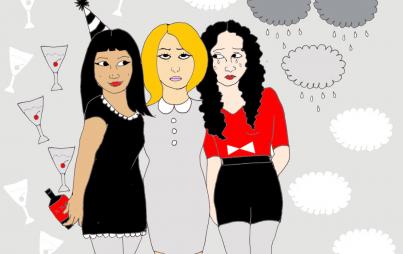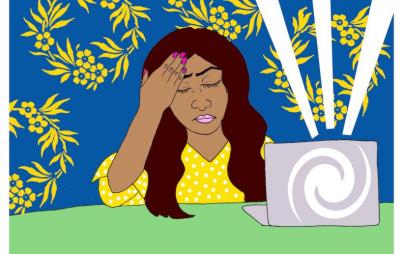
At a certain point in my adulthood, I stopped trying to force friendships that just didn’t work.
Back when I was a Brownie, I learned: “Make new friends, but keep the old. One is silver and the other gold.”
Friendships, in other words, are invaluable, and for the most part, it’s true. Our friends make us laugh when we’re down, tell us the truth when we need to hear it, and teach us all the stuff we didn’t learn from mom. But some friendships, as Tomi Obara observed in an essay for Buzzfeed, are formed not from mutual love and respect but out of habit, and bound by loyalty that’s created as a result.
"While these women may not particularly like each other,” Obara writes, "they are still committed to one another.”
I’ve had these kinds of friendships, too. Friendships with people we don’t particularly like and with whom we have nothing in common — people whose lives and ways irritate us — can cling on like a cough. In some cases, these relationships are toxic, and both parties would be better off without them.
If you find yourself on the brink of a platonic breakup, here are my recommendations:
1. Let the inevitable happen.
Sometimes the thing to do is nothing. Case in point: Some years ago, I wrote about ending a toxic friendship with a woman named Marie. Marie was often angry with me for this reason or that, and I found myself walking on eggshells to keep from upsetting her. One summer, Marie and I co-taught a writing workshop together, and when it was over, Marie confronted me over a series of perceived wrongs.
In the past, I’d always tried to minimize conflict between us. I’d soothe her bruised ego and make excuses for the mean things she said. This time, as she laid into me, I didn’t argue back or interrupt to try and minimize the damage. Instead, I just listened. After she hung up on me, I didn’t call her back. I didn’t try to repair the friendship like I might’ve done in the past. I knew the friendship was over. And it was. Some days later, she unfriended me on Facebook, and we never spoke again.
2. Choose your words carefully.
In the case of Marie, making no effort was enough of an effort to see the toxic friendship to its end. Other times, something does need to be said. There’s a difference, I’ve learned, between trying to repair a relationship, and trying to end it. Figure out what you’re after. Then, take some time and decide how to communicate your desires.
Last summer, after I got engaged and as I planned my wedding, I grew further and further apart from my best friend, who I’d named my maid of honor. When she and I talked, we avoided discussing the wedding. She grew increasingly detached, and I more or less planned it without her, hoping until the last minute she’d step up. Instead, at the wedding, she was a major source of drama.
In retrospect, I see that I could’ve done a better job expressing my needs, but I was afraid of being disappointed — which I ultimately was. Afterward, we didn’t talk. She didn’t call me, and I didn’t call her. We didn’t have a reason to — but back when we’d been friends, we hadn't needed a reason. What made the situation more awkward was that some months earlier I had scored her an apartment in my building. She was literally my upstairs neighbor.
Related: Let's Not Be Friends: On Female Friendship
And so, the day came when we crossed each other on the street.
Some weeks after the wedding, my husband Arran and I were walking up to the building as she and some guy I’d never seen before walked past. It happened so fast; we didn’t acknowledge one another.
This happened a couple more times until, after two months of not speaking, I got an email. Like Marie, my former friend went off on me, spelling out everything she thought I’d done wrong on my wedding day and how I had no right to feel mad. By then, I wasn’t mad so much as hurt and confused. I missed my best friend. But her email wasn’t the enjoiner I had hoped for all summer. Instead, it was defensive, accusatory, and just plain weird.
For a day or two, I thought about how to respond. As much as I’d hoped we could repair our relationship, I didn’t believe it was possible — especially after the email. And even before. I wrote back and told her I was sorry she felt the way that she did. I didn’t want us to keep ignoring each other in the hall — but I didn’t want to get coffee either, as she suggested in her email. She wrote a curt reply, unfriended me on Facebook, and that was the end.
3. Take responsibility, rather than blaming the other person.
In both the case of Marie, as well as my maid of honor, I could go on and on about what I felt these people did wrong to me. I could list all the ways I was a good friend, and they weren’t, and all my perceived hurts. Of course, they could tell stories of their own. We could go back and forth, possibly forever.
But for what?
“The real story isn’t who did what. The real story is the part where you’re exhausted by this person and relieved to have some distance.” This, according to Refinery29’s advice columnist, Kelsey Millerto, in response to a reader who asked, Is it time to break up with my best friend?
My advice? If you’re asking the question, it’s probably time.
At a certain point in my adulthood, I stopped trying to force friendships that just didn’t work. If a person didn’t make me feel good, and I didn’t enjoy hanging out with them, no hard feelings. Sure, sometimes a relationship has issues that need to be worked out. But for the most part, I let people be who they are— and if I expect something more, I find it elsewhere.
4. Be gentle; it may hurt.
In the case of my maid of honor, in particular, I knew our breakup would hurt her. What I wasn’t prepared for was how much it hurt me. When a friendship doesn’t work out, particularly one that we valued, there’s a loss to mourn. Especially when it’s a best friend, the absence leaves a gap. You learn to fill it: you spend time by yourself, time with your partner, time with new and better friends.








